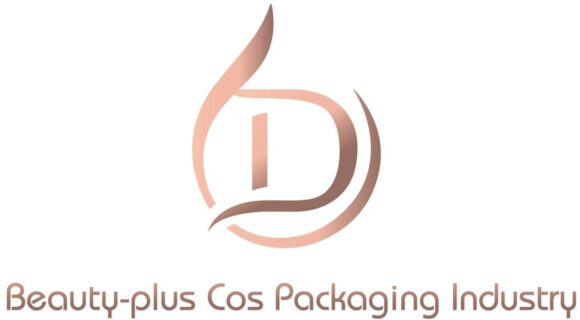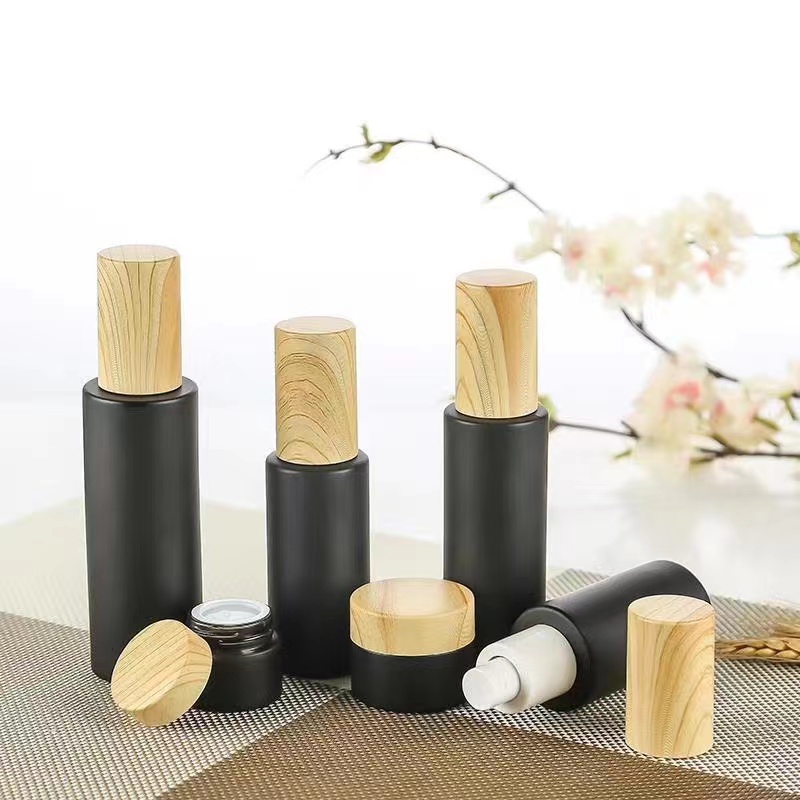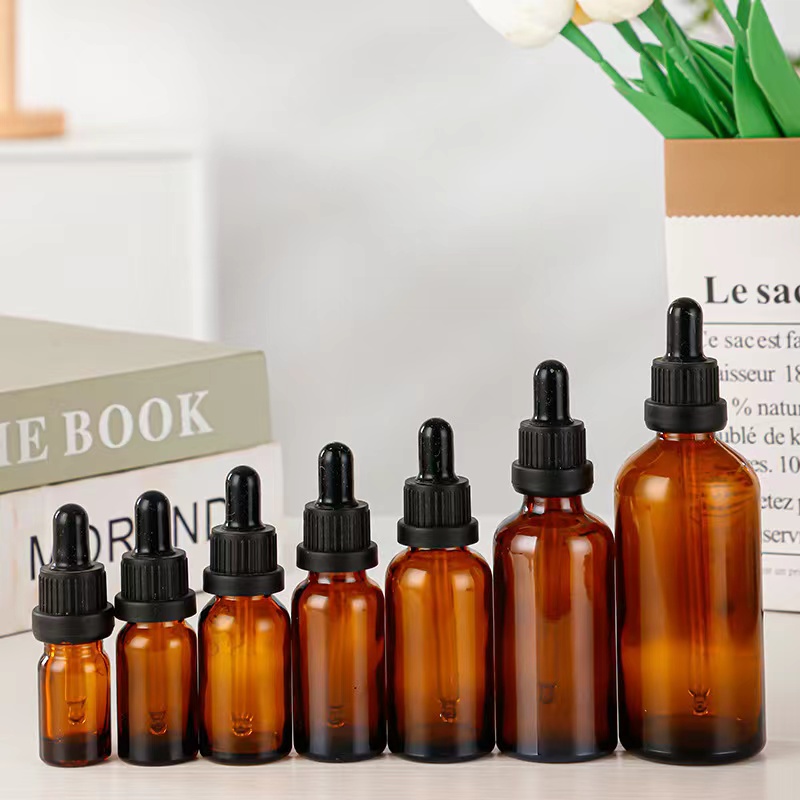Glass Bottles
Home / Product
Your Trusted Supplier of Glass Bottles
Glass bottles are the epitome of elegance and durability, making them a preferred choice for premium cosmetic products. With their ability to preserve the integrity of formulas, they are ideal for skincare, serums, and essential oils. At BEAUTYPLUS, we provide high-quality glass bottles in various designs and capacities to elevate your brand’s image and meet diverse customer preferences.
All You Need To Know About Glass Bottles
Cosmetic glass bottles have long been a popular choice in the beauty and skincare industry due to their elegant appearance, durability, and ability to preserve product quality. They are particularly favored for premium and eco-conscious brands seeking packaging that conveys luxury, sustainability, and functionality.
This introduction explores the key features, benefits, and applications of glass bottles in the cosmetic industry, highlighting why they remain a timeless and versatile packaging solution.
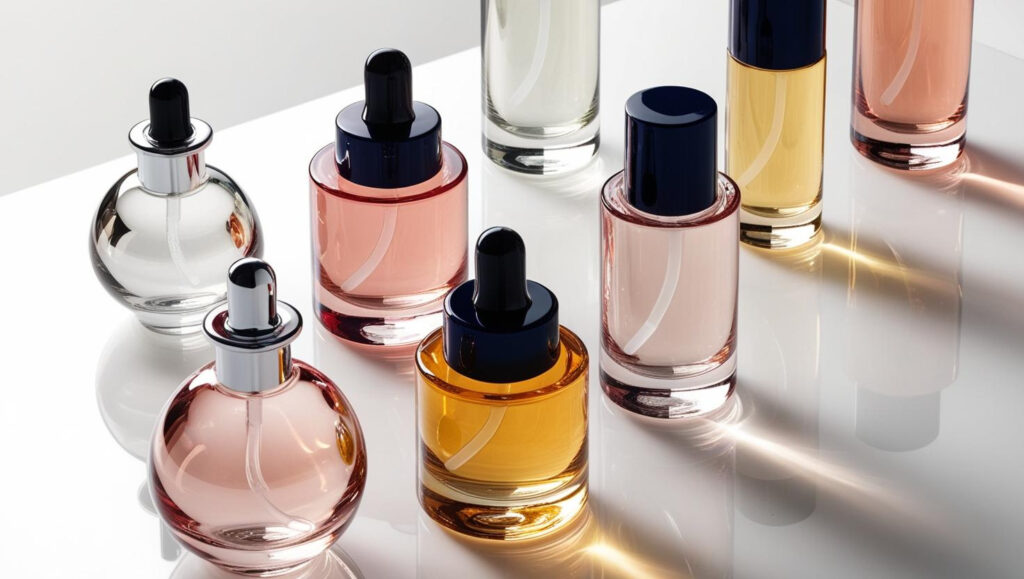
What Are Cosmetic Glass Bottles?
Cosmetic glass bottles are containers made from high-quality glass designed to store and protect a variety of beauty, skincare, and personal care products. These bottles are available in various shapes, sizes, and styles and are often paired with compatible closures such as droppers, pumps, or screw caps. Glass bottles are commonly used for:
* Skincare products: Serums, moisturizers, facial oils, and toners.
* Haircare products: Hair serums, oils, and treatments.
* Makeup: Foundations, liquid highlighters, and setting sprays.
* Fragrances: Perfumes, colognes, and body mists.
* Wellness products: Essential oils and aromatherapy blends.
Key Features
1. High Durability
* Glass is a strong and stable material that resists scratches, deformation, and wear, making it an excellent choice for long-term use and travel-friendly packaging.
2. Non-Reactive and Safe
* Glass is chemically inert, meaning it does not react with the contents it stores. This makes it an ideal option for sensitive formulations, active ingredients, and natural or organic products.
3. Transparency
* Clear glass bottles allow consumers to see the product inside, adding to the aesthetic appeal and building trust in the product’s quality and quantity.
4. Versatile Design Options
* Glass bottles can be customized with various colors, finishes, and closures to align with a brand’s image, from sleek and minimalist designs to vibrant and decorative aesthetics.
5. Eco-Friendly Material
* Glass is 100% recyclable and can be reused or repurposed, making it a sustainable option for environmentally conscious brands and consumers.
Advantages
1. Premium Look and Feel
* Glass bottles exude elegance and sophistication, making them a preferred choice for luxury beauty and skincare brands. Their weight and smooth finish enhance the user’s tactile experience, contributing to a premium brand image.
2. Preservation of Product Quality
* Glass provides a robust barrier against light, air, and moisture, which helps preserve the freshness, potency, and stability of cosmetic formulations. This is particularly important for products with sensitive active ingredients such as antioxidants, essential oils, or Vitamin C.
3. Hygienic and Non-Porous
* Glass is non-porous and resistant to bacteria, ensuring that the product remains free from contamination over time. This is a key consideration for cosmetics and skincare products used on the skin or face.
4. Chemical Stability
* Unlike some plastic packaging, glass does not leach chemicals into the product, ensuring the safety and purity of the formulation.
5. Sustainability and Reusability
* As a recyclable material, glass aligns with the growing consumer demand for sustainable packaging. Many brands also encourage reusability by offering refillable glass bottles.
Why Choose Glass for Cosmetics?
Glass has been a staple packaging material in the cosmetics industry for decades, and it continues to be a preferred choice for brands and consumers alike. Its unique combination of aesthetic, functional, and eco-friendly properties makes it a standout option for storing and presenting a wide range of beauty and skincare products. Here’s why glass is an excellent choice for cosmetic packaging:
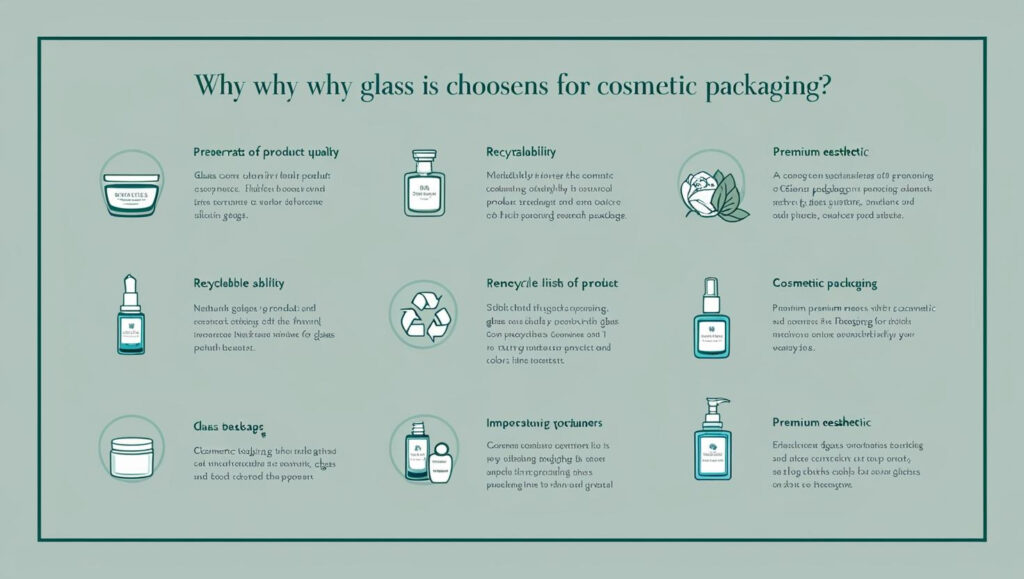
1. Premium Look and Feel
* Luxurious Aesthetic: Glass bottles convey sophistication and elegance, making them a go-to choice for high-end beauty and skincare brands. Their smooth, glossy finish and heavier weight provide a premium, tactile experience that appeals to consumers seeking luxury products.
* Brand Elevation: Glass packaging enhances the perceived value of a product, reinforcing a brand’s commitment to quality and exclusivity.
2. Superior Product Protection
* Preserves Product Integrity: Glass is impermeable to air, moisture, and external contaminants, providing an airtight barrier that helps preserve the freshness, potency, and stability of cosmetic formulations.
* UV Protection: Colored glass, such as amber or cobalt blue, protects light-sensitive ingredients like Vitamin C, retinol, and essential oils from harmful UV rays, ensuring the product remains effective over time.
3. Safe and Non-Reactive Material
* Chemical Stability: Unlike some plastics, glass does not leach chemicals into the product, making it ideal for sensitive formulations, organic products, or those with active ingredients.
* Neutrality: Glass is chemically inert, meaning it doesn’t react with its contents, ensuring the purity and safety of the product inside.
4. Hygienic and Easy to Clean
* Non-Porous Surface: Glass is non-porous, which prevents bacteria and other contaminants from embedding in the material. This makes it an excellent choice for products that require high hygiene standards, such as facial serums or medicinal skincare.
* Reusable: Glass bottles can be easily cleaned and sterilized for reuse, supporting brands and consumers looking to reduce waste.
5. Eco-Friendly and Sustainable
* 100% Recyclable: Glass can be recycled endlessly without losing quality, making it one of the most sustainable packaging materials available.
* Reusability: Consumers can repurpose or refill glass containers, reducing the need for single-use packaging.
* Biodegradability: Unlike plastics, which can take hundreds of years to break down, glass is a natural material that does not contribute to microplastic pollution.
* Supports Sustainable Branding: Glass packaging aligns with eco-conscious consumer values and global efforts to reduce environmental impact, enhancing a brand’s commitment to sustainability.
6. Versatile Design and Customization
* Variety of Styles: Glass bottles come in a wide range of shapes, sizes, and finishes, making them suitable for everything from facial serums and toners to perfumes and hair treatments.
* Customizable: Brands can personalize glass packaging with embossing, silk-screen printing, labels, or unique colors to reflect their identity and make their products stand out.
* Elegant Closures: Glass bottles can be paired with droppers, pumps, spray nozzles, or screw caps to suit the product’s specific application and user needs.
7. Consumer Preference
* Perceived Quality: Consumers often associate glass packaging with higher-quality products due to its premium appearance and weighty feel.
* Eco-Conscious Choice: With growing awareness of plastic pollution, many consumers prefer glass over plastic for its recyclability and environmental benefits. Offering glass packaging can attract eco-conscious buyers and foster brand loyalty.
8. Longevity and Durability
* Robust Material: Glass is highly durable and resistant to scratches, maintaining its appearance over time. While it can break under heavy impact, modern manufacturing techniques like tempered glass make it more resilient.
* Temperature Resistance: Glass can withstand high and low temperatures without degrading, making it ideal for products that need to be stored under specific conditions.
9. Ideal for High-Performance and Sensitive Products
* Anti-Aging Skincare: Glass protects sensitive ingredients like antioxidants, peptides, and hyaluronic acid from degradation caused by air or light exposure.
* Natural and Organic Products: For brands that avoid synthetic preservatives, glass is the perfect choice for ensuring product longevity and integrity.
* Perfumes and Fragrances: Glass bottles are non-reactive, ensuring that fragrances retain their intended scent and do not evaporate.
10. Alignment with Industry Trends
* Luxury Market Growth: As the demand for premium cosmetics continues to rise, glass remains the material of choice for brands looking to position themselves in the luxury market.
* Sustainability Trends: With consumers prioritizing environmentally friendly products, glass packaging supports the shift towards sustainable beauty practices.
* Minimalist Aesthetic: Glass’s clean, sleek look complements the minimalist design trend in modern cosmetic branding.
Choosing glass for cosmetic packaging offers unparalleled benefits in terms of product protection, sustainability, aesthetics, and consumer appeal. Whether you’re launching a high-end skincare line, a natural beauty brand, or a luxury fragrance, glass packaging enhances both the functionality and perceived value of your products. With its combination of timeless elegance, eco-friendliness, and safety, glass remains a top choice for brands looking to deliver exceptional quality and align with modern consumer preferences.
Applications
Glass bottles are a versatile and highly functional packaging solution widely used in the cosmetics, skincare, personal care, and wellness industries. Their durability, aesthetic appeal, and ability to preserve sensitive formulations make them an ideal choice for a range of products. Below are the most common applications of glass bottles in these sectors:
1. Skincare Products
Serums
* Glass dropper bottles are ideal for storing facial serums, especially those with sensitive ingredients like Vitamin C, retinol, and peptides. Glass protects the formulation from air, light, and temperature fluctuations, maintaining its potency.
* Common bottle styles: Amber dropper bottles for UV protection and clear bottles for aesthetic appeal.
Facial Oils
* Glass bottles with dropper caps or pumps are perfect for facial oils. Their non-reactive properties ensure the oil’s purity while providing precise dispensing.
* Popular styles: Frosted glass bottles for a luxurious look.
Moisturizers and Lotions
* Glass pump bottles are often used for lightweight or liquid moisturizers, ensuring hygienic and controlled dispensing.
Toners and Essences
* Glass spray bottles are ideal for facial toners and essences. They offer an even mist application, making them practical and visually appealing.
2. Haircare Products
Hair Serums and Oils
* Glass bottles are widely used for hair serums, scalp treatments, and oils. They help maintain the effectiveness of nourishing ingredients like argan oil, jojoba oil, and keratin.
* Pump dispensers or droppers are commonly used for easy application.
Leave-In Treatments
* Spray bottles made of glass are often chosen for leave-in conditioners and heat-protectant sprays, offering precise and even application.
3. Makeup Products
Liquid Foundations
* Glass bottles with pumps provide an elegant and functional solution for storing liquid foundations. They prevent contamination and ensure accurate dispensing.
* Popular styles: Transparent or frosted glass bottles to showcase the product’s shade.
Makeup Setting Sprays
* Glass spray bottles are perfect for setting sprays, offering an even and controlled mist for better application.
Liquid Highlighters and Tints
* Dropper bottles made of glass are ideal for storing liquid highlighters and tints, providing precise control for small, concentrated applications.
4. Perfumes and Fragrances
Perfume Bottles
* Glass is the material of choice for perfumes due to its impermeability and ability to preserve volatile fragrance molecules. Glass ensures that scents retain their intended aroma over time.
* Available options: Transparent or colored glass with decorative finishes to enhance the luxury appeal.
Roll-On Fragrances
* Glass roll-on bottles are commonly used for travel-friendly or pocket-sized perfumes. They are compact, stylish, and convenient for targeted application.
Body Mists and Sprays
* Glass spray bottles are popular for body mists, offering a high-end alternative to plastic packaging.
5. Essential Oils and Aromatherapy
Essential Oil Storage
* Amber and cobalt blue glass bottles are frequently used for essential oils. These dark-colored bottles block harmful UV rays, preserving the potency of the oils.
* Available closures: Dropper caps, reducer inserts, or roll-on applicators.
Aromatherapy Blends
* Glass bottles are ideal for storing aromatherapy blends, often paired with droppers or sprays for precise application.
Room and Pillow Sprays
* Glass spray bottles are used for aromatherapy sprays, providing a fine mist application while maintaining the integrity of the essential oils.
6. Wellness and Medicinal Products
Medicinal Skincare
* Products like acne treatments, scar reduction serums, and medicated oils are often packaged in glass bottles to protect sensitive formulations.
Herbal Remedies and Tinctures
* Glass bottles with dropper caps are the preferred choice for tinctures and herbal extracts, ensuring precise dosing and product stability.
Vitamins and Supplements
* Glass bottles are used for liquid supplements like collagen, liquid vitamins, or herbal tonics. They prevent leaching and preserve the formulation’s quality.
7. Natural and Organic Products
Natural Skincare
* Organic and preservative-free products benefit from glass bottles, as they protect against contamination and environmental factors.
* Popular choices: Amber or frosted glass to convey an eco-friendly, natural aesthetic.
Refillable Products
* Many eco-conscious brands use glass bottles for refillable product lines, offering consumers sustainable alternatives to single-use packaging.
8. Luxury Products
High-End Cosmetics
* Luxury brands use glass bottles to enhance the perceived value of their products. Decorative elements such as embossed logos, metallic finishes, or frosted surfaces add a sophisticated touch.
Limited Edition Collections
* For exclusive or seasonal collections, glass bottles are often chosen to create a premium, collectible appeal.
9. DIY and Niche Products
Homemade Skincare and Cosmetics
* Glass bottles are popular among DIY enthusiasts for homemade serums, oils, or sprays. They are easy to sterilize and provide professional-level packaging for personal use.
Small-Batch Artisanal Brands
* Niche brands and small businesses often use glass bottles to emphasize quality and craftsmanship in their products.
10. Travel-Friendly Packaging
Miniature Bottles
* Glass bottles in smaller sizes (e.g., 10ml or 15ml) are used for travel kits, sample products, or single-use applications.
* Roll-on or spray closures make them convenient for on-the-go use.
Glass bottles are a versatile and premium packaging solution that meets the needs of a wide range of cosmetic, skincare, and wellness products. Their ability to protect sensitive formulations, align with sustainability goals, and elevate brand aesthetics makes them a preferred choice for both mass-market and luxury brands. Whether you’re packaging a facial serum, a signature fragrance, or an essential oil blend, glass bottles provide the perfect combination of functionality, durability, and elegance.
Types
Glass bottles are a versatile and elegant packaging solution for cosmetics, skincare, and personal care products. They come in various shapes, sizes, colors, and closure systems to suit different formulations and branding needs. Below is an overview of the most popular types of glass bottles used in the cosmetics industry:
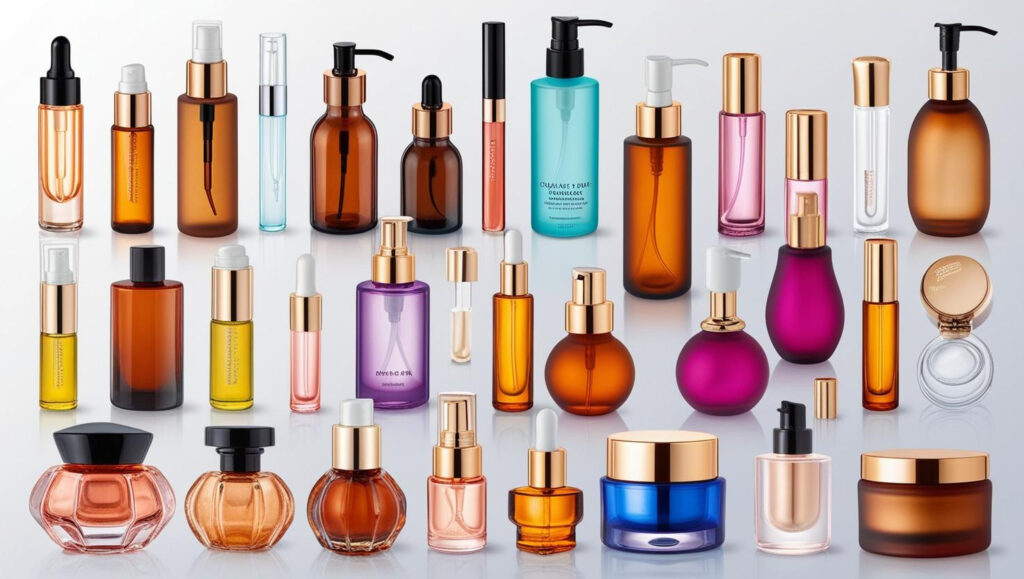
1. Dropper Bottles
* Description: Dropper bottles feature a screw cap with an integrated dropper for precise dispensing of liquid products. The dropper is typically made of glass or plastic with a rubber bulb for easy control.
* Applications: Serums (e.g., Vitamin C, hyaluronic acid), Facial oils, Essential oils, Tinctures.
* Common Colors: Clear, amber, cobalt blue, frosted, or green for UV protection or aesthetic appeal.
* Sizes: Commonly available in 10ml, 15ml, 30ml, and 50ml options.
2. Roll-On Bottles
* Description: Roll-on bottles feature a small rollerball applicator attached to the bottle’s opening, allowing for targeted and mess-free application.
* Applications: Perfumes and fragrances, Essential oils, Eye serums, Spot treatments.
* Materials: Rollerballs can be made of metal, glass, or plastic, depending on the product’s formulation.
Sizes: Typically available in 5ml to 15ml sizes, making them ideal for travel or sampling.
3. Spray Bottles
* Description: Spray bottles feature a nozzle or atomizer that delivers a fine mist, making them ideal for lightweight, sprayable products.
* Applications: Toners, Setting sprays, Body mists, Hair sprays.
* Features: Even application & Lockable spray caps for travel.
* Common Colors: Clear, frosted, or amber glass for UV-sensitive products.
4. Pump Bottles
* Description: Glass bottles with a pump mechanism for dispensing liquid or semi-liquid products. Pumps can be designed for different viscosities, from lightweight lotions to thick creams.
* Applications: Liquid foundations, Moisturizers, Serums, Haircare products (e.g., hair oils, scalp treatments).
* Features: Controlled dispensing & Can include a locking mechanism for travel use.
* Sizes: Available in various sizes, typically ranging from 15ml to 100ml.
5. Amber and Colored Glass Bottles
* Description: These bottles are made with tinted glass to block harmful UV rays, which can degrade light-sensitive ingredients.
* Applications: Essential oils, Aromatherapy blends, Medicinal skincare (e.g., acne treatments, serums).
* Colors: Amber, cobalt blue, green, and black.
* Benefits: Enhances shelf life by preserving product integrity.
6. Frosted Glass Bottles
* Description: Frosted glass bottles have a matte finish that exudes elegance and provides a soft, premium look. They are often used for high-end products.
* Applications: Luxury serums, Anti-aging creams, Premium fragrances.
* Features: Available with various closures like pumps, droppers, or sprays.
7. Perfume Bottles
* Description: Designed specifically for storing and dispensing perfumes and fragrances, perfume bottles come in various artistic shapes and decorative finishes.
* Applications: Perfumes, Eau de toilettes, Cologne.
* Features: Intricate designs and closures such as spray nozzles, screw caps, or decorative toppers.
* Customization: Embossing, metallic finishes, or colored glass for a luxurious look.
8. Wide-Mouth Jars
* Description: While technically not bottles, wide-mouth glass jars are commonly used for thicker cosmetic products. These containers are easy to fill and access, making them ideal for creams and balms.
* Applications: Face creams, Body butter, Masks and scrubs.
* Features: Paired with screw caps or bamboo lids for eco-friendly appeal.
9. Refillable Bottles
* Description: These glass bottles are designed for reuse and are compatible with refill systems, aligning with sustainability goals.
* Applications: Refillable toners, Reusable fragrance bottles, Refillable serums.
* Features:Sturdy glass construction to withstand multiple uses. Compatible with pumps, droppers, or screw caps for easy refilling.
10. Unique and Custom Shapes
* Description: Custom-molded glass bottles designed to match specific branding or product themes. These bottles can include intricate shapes, embossing, or custom colors.
* Applications: Limited edition collections, High-end skincare and makeup, Niche and artisanal products.
* Customization Options: Custom shapes, finishes, and closures to stand out on the shelf.
11. Miniature Glass Bottles
* Description: Small-sized glass bottles designed for travel kits, samples, or one-time use.
* Applications: Travel-sized serums, perfumes, or oils. Promotional samples.
* Sizes: Typically 5ml to 15ml.
* Features: Available in dropper, spray, or roll-on closures.
12. Light-Diffusing Bottles
* Description: These bottles feature frosted or tinted finishes that diffuse light, offering additional protection for sensitive formulations while creating a sleek, modern aesthetic.
* Applications: Skincare products with active ingredients. Essential oil blends. Natural cosmetics.
* Features: Enhanced UV protection and visual appeal.
13. Pharmaceutical-Grade Bottles
* Description: These are high-quality glass bottles designed to meet pharmaceutical standards, ensuring maximum product safety and integrity.
* Applications: Medicinal skincare, Tinctures, Prescription cosmetic products.
* Features: Child-proof caps or tamper-evident seals.
The versatility of glass bottles makes them an ideal choice for a wide range of cosmetic and personal care products. From luxurious frosted designs for high-end skincare to amber bottles for essential oils, glass packaging can be tailored to meet specific product needs while enhancing brand appeal. Their durability, eco-friendliness, and premium aesthetic ensure that they remain a top choice for brands and consumers alike.
Certifications and Compliance
Cosmetic glass bottles must meet various certifications and compliance standards to ensure product safety, environmental responsibility, and regulatory adherence. These certifications are critical for building consumer trust, protecting formulations, and aligning with global sustainability efforts. Here’s an overview of the key certifications and compliance standards applicable to glass bottles in the cosmetics industry:
1. Product Safety Certifications
* FDA (Food and Drug Administration) Compliance (USA)
* Purpose: Ensures that materials used in glass bottles are safe for cosmetic and skincare products.
* Requirements: Glass must be non-toxic, chemically inert, and free of harmful substances that could leach into the product. Bottles intended for food-grade or edible cosmetics (e.g., lip gloss, edible oils) must meet FDA food-contact safety standards.
* Importance: Guarantees consumer safety and product integrity.
* REACH (Registration, Evaluation, Authorization, and Restriction of Chemicals) (EU)
* Purpose: Regulates the use of chemical substances in manufacturing to minimize health and environmental risks.
* Requirements: Glass bottles must not contain restricted substances. Manufacturers must ensure full transparency about materials used.
* Importance: Ensures compliance with EU environmental and safety standards.
* CPSIA (Consumer Product Safety Improvement Act) (USA)
* Purpose: Regulates the use of chemical substances in manufacturing to minimize health and environmental risks.
* Requirements: Glass bottles must not contain restricted substances. Manufacturers must ensure full transparency about materials used.
* Importance: Ensures compliance with EU environmental and safety standards.
2. Environmental and Sustainability Certifications
* ISO 14001 (Environmental Management System)
* Purpose: Certifies that the manufacturing process adheres to environmental management standards.
* Requirements: Reduction of environmental impact during glass production. Sustainable sourcing of raw materials (e.g., silica, soda ash). Efficient use of energy and resources.
* Importance: Demonstrates a brand’s commitment to sustainability and responsible production practices.
* Cradle to Cradle Certification
* Purpose: Evaluates products for their entire lifecycle, emphasizing sustainability and circular economy principles.
* Requirements: Glass bottles must be recyclable, non-toxic, and designed for reuse. Assessment includes material health, renewable energy use, water stewardship, and social fairness.
* Importance: Appeals to environmentally conscious consumers and brands focused on sustainability.
* FSC (Forest Stewardship Council) Certification (if paired with paper components)
* Purpose: Ensures that paper or cardboard materials used in glass bottle packaging (e.g., labels, boxes) are sourced sustainably.
* Requirements: Materials must come from responsibly managed forests.
* Importance: Adds a layer of eco-certification for glass bottles with additional paper-based packaging.
* Recyclable and Eco-Friendly Material Certification
* Purpose: Verifies the recyclability of glass bottles.
* Requirements: Glass must be made from recyclable materials or incorporate post-consumer recycled (PCR) content.
* Importance: Aligns with global sustainability goals and reduces waste.
3. Quality Standards
* ISO 9001 (Quality Management System)
* Purpose: Ensures consistent quality in manufacturing processes.
* Requirements: Regular quality checks and testing during the production of glass bottles. Standardization of processes to minimize defects.
* Importance: Builds customer confidence in the durability and reliability of the glass bottles.
* GMP (Good Manufacturing Practices)
* Purpose: Regulates the hygiene and manufacturing practices in the production of glass bottles for cosmetics.
* Requirements: Clean production environments. Strict controls on materials, processes, and finished products.
* Importance: Guarantees that glass bottles are safe and suitable for cosmetic use.
4. Safety and Usability Certifications
* Child-Resistant Packaging Certification
* Purpose: Ensures safety for products intended for use around children.
* Requirements: Glass bottles must include certified child-resistant closures (CRC) for products like essential oils, perfumes, or medicated cosmetics.
* Importance: Prevents accidental ingestion or misuse.
* Tamper-Evident Seals Certification
* Purpose: Ensures the integrity of the product before consumer use.
* Requirements: Glass bottles must feature tamper-evident seals or closures to indicate whether the product has been opened.
* Importance: Enhances consumer trust in product safety.
* UV Protection Certification
* Purpose: Protects light-sensitive products from UV degradation.
* Requirements: Amber, cobalt blue, or coated glass must be certified for their ability to block harmful UV rays.
* Importance: Prolongs shelf life and maintains product efficacy.
5. Compliance with Cosmetic Industry Regulations
* EU Cosmetic Regulation (EC) No. 1223/2009
* Purpose: Governs the safety of cosmetic products sold in the European Union.
* Requirements: Glass bottles used for cosmetics must not interact chemically with their contents. Manufacturers must provide full documentation of materials used.
* Importance: Ensures compliance for brands selling in the EU.
* ASTM Standards (American Society for Testing and Materials)
* Purpose: Provides testing standards for materials, including glass, to ensure quality and performance.
* Requirements: Glass bottles must meet ASTM standards for durability, strength, and chemical resistance.
* Importance: Guarantees product reliability under normal usage conditions.
6. Ethical and Social Responsibility Certifications
* Fair Trade Certification
* Purpose: Ensures that materials used in the production of glass bottles are sourced ethically and that workers are treated fairly.
* Requirements: Verification of ethical labor practices and sustainable sourcing of raw materials.
* Importance: Enhances brand reputation among ethically conscious consumers.
* B Corporation Certification
* Purpose: Recognizes companies that meet high social and environmental standards.
* Requirements: Glass bottle manufacturers must demonstrate sustainable practices and social accountability.
* Importance: Builds trust with consumers and aligns with brands that prioritize corporate social responsibility.
7. Additional Certifications for Export
* CE Marking (Conformité Européene)
* Purpose: Certifies that glass bottles meet health, safety, and environmental protection requirements for sale within the European Economic Area (EEA).
* Requirements: Products must comply with EU standards for safety and performance.
* Importance: Facilitates trade within the European Union.
* FDA Export Certification
* Purpose: Allows glass bottles intended for export from the USA to meet the destination country’s regulatory requirements.
* Requirements: Compliance with the exporting country’s specific safety and quality standards.
* Importance: Ensures a smooth export process for global sales.
Certifications and compliance for cosmetic glass bottles play a vital role in ensuring product safety, environmental responsibility, and adherence to global regulations. These certifications not only build consumer trust but also support brand values of quality, sustainability, and ethical practices. By choosing certified glass bottles, cosmetic brands can protect their products, enhance their reputation, and meet the expectations of today’s increasingly conscientious consumers.
Ordering and Customization Process
The ordering and customization process for cosmetic glass bottles involves several steps to ensure that the bottles meet your product specifications, brand identity, and regulatory requirements. This process is designed to provide flexibility and allow you to create packaging that aligns with your brand’s vision. Below is a comprehensive guide to the ordering and customization process:
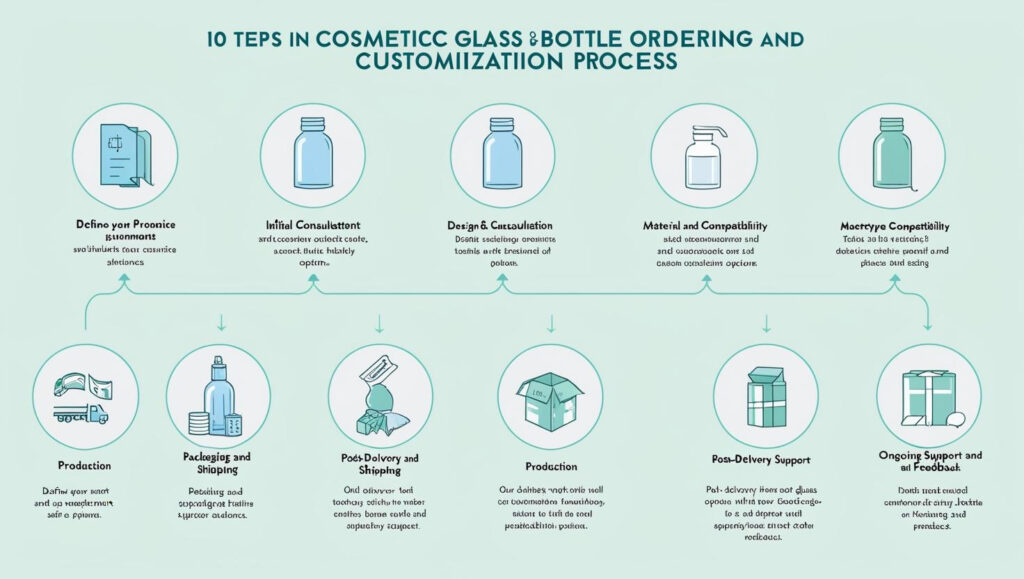
Step 1: Define Your Requirements
Before placing an order, clearly identify your packaging needs:
1.1 Product Type
* Determine the type of product you’re packaging (e.g., serums, perfumes, oils, lotions).
1.2 Bottle Size and Capacity
* Choose the appropriate volume (e.g., 10ml, 30ml, 100ml) based on your product’s use case.
1.3 Material Preferences
* Decide whether you need clear, frosted, amber, or colored glass, depending on your product’s sensitivity to light and your brand’s aesthetic.
1.4 Closure Type
* Select a compatible closure, such as droppers, pumps, sprays, roll-ons, or screw caps.
Step 2: Initial Consultation
Reach out to a supplier or manufacturer to discuss your requirements:
2.1 Provide Specifications
* Share details about the product, including its viscosity, chemical composition, and sensitivity to light or air.
2.2 Customization Goals
* Discuss your desired design elements, such as colors, branding, and finishes.
2.3 Quantity
* Confirm your order size. Many suppliers have minimum order quantities (MOQs) that vary depending on the level of customization.
Step 3: Design and Customization Options
Work with the supplier to finalize the design and customization details:
3.1 Bottle Shape
* Standard shapes (round, square, oval) or custom molds for unique designs.
3.2 Color and Finish
* Specify the number of units required, often with minimum order quantities (MOQs).
3.3 Branding
* Add logos, product names, or other designs using techniques like silk-screen printing, embossing, or UV printing.
3.4 Closures and Accessories
* Select compatible closures (e.g., pumps, droppers, or sprays) and customize their colors or materials.
Step 4: Material and Compatibility Testing
Test the compatibility of the glass bottle with your product:
4.1 Leakage Tests
* Ensure that the closures provide a tight seal.
4.2 Chemical Compatibility
* Verify that the glass and closure materials do not react with your product.
4.3 Dispensing Efficiency
* Test pumps, droppers, or sprays to ensure smooth dispensing.
Step 5: Prototype Development
Request a prototype or sample:
5.1 Purpose
* The prototype allows you to evaluate the design, functionality, and aesthetic of the glass bottle before full production.
5.2 Adjustments
* Provide feedback on the prototype to refine the design or functionality if needed.
Step 6: Finalize Order Details
Confirm the order specifics:
6.1 Quantity
* Decide the total number of units, keeping in mind MOQs for custom designs.
6.2 Lead Time
* Establish a timeline for production and delivery. Custom orders may take 4–12 weeks, depending on complexity.
6.3 Pricing
* Finalize the pricing structure, including unit costs, customization fees, and shipping expenses.
* Some suppliers offer bulk discounts for larger orders.
Step 7: Production
The manufacturer will begin mass production:
7.1 Manufacturing Process
* This includes glass molding, customization (e.g., printing or frosting), and assembly with closures.
7.2 Quality Control
* The manufacturer will conduct quality checks to ensure the bottles meet specifications, are free of defects, and perform as expected.
Step 8: Packaging and Shipping
Prepare the finished glass bottles for delivery:
8.1 Packaging
* Bottles are packed securely to prevent damage during transport.
Additional packaging materials (e.g., boxes, inserts) may be included if requested.
8.2 Shipping Options
* Choose from standard or expedited shipping based on your timeline.
* International shipping may require additional documentation for customs.
Step 9: Post-Delivery Support
Once you receive your order:
9.1 Inspection
* Inspect the shipment for defects or inconsistencies.
* Perform final quality checks on random samples to ensure compliance.
9.2 Reordering and Scaling
* If satisfied, establish a reorder system for future production runs.
* Discuss options for scaling up production if needed.
Step 10: Ongoing Support and Feedback
Maintain a relationship with your supplier:
10.1 Continuous Improvement
* Provide feedback to improve future orders.
Additional packaging materials (e.g., boxes, inserts) may be included if requested.
10.2 Customization Updates
* Explore new customization trends or designs for future product lines.
10.3 Refillable Solutions
* If sustainability is a priority, work with the supplier to implement refillable or eco-friendly glass bottle systems.
Key Considerations
1. Sustainability
* Opt for eco-friendly glass options like PCR (post-consumer recycled) glass or refillable designs.
* Minimize waste by selecting recyclable closures and packaging materials.
2. Compliance
* Ensure the bottles meet relevant certifications (e.g., FDA, REACH, ISO) for safety and quality.
3. Budget Management
* Balance customization costs with your budget by prioritizing high-impact design elements.
* Consider ordering in bulk to lower per-unit costs.
4. Branding Alignment
* Match the bottle design to your brand’s aesthetic and target audience to maximize consumer appeal.
The ordering and customization process for cosmetic glass bottles is a collaborative effort between the brand and the supplier. By clearly defining your requirements, testing prototypes, and maintaining open communication throughout production, you can create packaging that not only protects and enhances your product but also elevates your brand. Whether you’re looking for a minimalistic design or an intricate, luxurious look, glass bottles offer endless possibilities for customization and functionality.
"Working with BEAUTYPLUS has been a game-changer for our business. As a brand owner with high expectations, we needed reliable packaging that would match our premium product standards. From the very first inquiry, the BEAUTYPLUS team was professional, attentive, and proactive. They provided a variety of packaging solutions that perfectly aligned with our vision, and their fast lead times allowed us to meet our launch deadlines seamlessly.."
Ronald RichardsManager Director
"What impressed us most was their flexibility—whether it was customizing bottle designs or arranging payment terms to suit our needs, BEAUTYPLUS made the entire process smooth and stress-free. Their access to a diverse range of suppliers gave us access to the exact packaging we were looking for. This partnership has been instrumental in scaling our operations, and we’ll certainly continue working with them in the future."
Avin BollwegDirector of Operations & NPD
Let's work together!
We’d love to hear from you! Send us a message using the form below.
